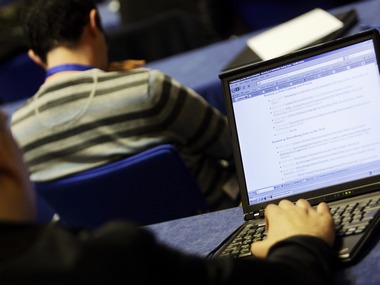The average connected Indian can’t live without the internet for more than 24 hours, says a new survey commissioned by Norton, the online security software company. Of those surveyed, 83 percent said that 24 hours was too long to be offline and half said they feel ‘withdrawal’ after just three hours offline.
This need to be online is a new trend among Indian netizens, says Norton.
[caption id=“attachment_260021” align=“alignleft” width=“380” caption=“Connected Indians say they privacy is their top priority: Reuters”]  [/caption]
When they are offline, 71 percent said that they missed work-related activities the most, with 51 percent missing the social aspects of their online life and 43 percent missing the “convenience of everyday living” such as paying bills or shopping.
“Indians are spending 12.9 hours browsing, 9.7 hours socializing and 6.1 hours on email every week.”
The survey’s respondents were rapacious internet users, spending 58 hours a week online, more than half their waking hours. They also owned an average of 2.8 internet-connected devices. Most, 90 percent, used a computer to get online, with half using their mobile phone and only 11 percent using a tablet.
How important is privacy?
Privacy is very important to connected Indians, with 96 percent saying that they need online security protection and 78 percent saying that they would “rather forgo USD1million thangivestrangersonlineaccesstotheir personal information”.
Personal information was the most valued, with 40 percent valuing financial information most highly and 35 percent putting a premium on their online accounts such as email and social networks. Privacy and blocking malware/viruses also ranked highly.
But 50 percent of respondents said that they were confused about online security and 60 percent thought that basic security was enough to protect them.
Clearly there’s a disconnect between the importance ascribed to privacy and security, and the levels of understanding about how to effectively protect oneself online. However, 89 percent of respondents do back up their personal information, such as documents, pictures, contacts and music.
The survey was carried out in February with 500 respondents, all active user of the internet, between the ages of 18 and 64. Just under half, 48 percent, of respondents were female.
Protect yourself
There’s no doubt that if you’re online, you need to protect your computer, your data and your privacy. Google and the UK’s Citizen Advice Bureau teamed up to produce Good To Know, a website that provides information about online security. Some key tips include:
Protect yourself from malware by making sure your operating system is up to date and by installing antivirus software.
Be careful what you click: Don’t click on links without thinking about whether they look iffy, and don’t download suspicious email attachments.
Don’t give away personal information such as log-in credentials or banking details without knowing exactly who you are dealing with. Beware sites that pretend to be something they are not.
Take care of your passwords: Use strong passwords, ie with letters numbers and punctuation characters. Have separate passwords that you don’t use anywhere else for your most important sites, e.g. your bank or your Facebook account.
So, does this picture of the connected Indian seem familiar to you? Could you live without the internet for 24 hours? What’s most important to you online? And how secure do you feel online?


)
)
)
)
)
)
)
)
)



